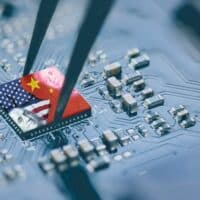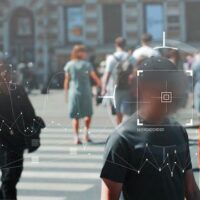-
TikTok and the threat to cultural hegemony
The following article by Carlos Martinez responds to a recent article in The Times complaining about TikTok users not being sufficiently anti-China. The only explanation the Times journalist can muster is that TikTok’s algorithms must be weighted to promote pro-CPC content.
-
Exposed: How Israeli spies control your VPN
An estimated 1.6 billion people rely on VPNs to carry out the most sensitive tasks online, from watching illegal videos to engaging in sexual or political activities.
-
The ill-starred consequences of America’s Chinese chip war
An interesting new article in the prominent American journal, “Foreign Affairs”, by three academics from Georgetown University, argues that “Washington should place less emphasis on slowing down China and more on improving its own innovative prowess.”
-
What’s behind the rise of AI powerhouse Nvidia?
Nvidia’s brief streak as the world’s highest valued company in the last several weeks has catapulted the chipset manufacturer into the headlines all over the world. A year ago, Nvidia was valued at just under $1 trillion. Nine months later, it blew past the $2 trillion mark, and just 30 days after that, for a moment in June 2024 Nvidia peaked at $3.3 trillion.
-
U.S. workers forced to bail out Intel, a top 100 company
President Biden announced the grant, part of the massive $280 billion CHIPS Act, on March 20 in Arizona.
-
Chip Wars: Breaking the siege
While the sanctions regime has hit Chinese companies, especially Huawei, hard and exposed weak links in China’s chip supply chain, the last year has seen significant progress by Chinese companies.
-
‘Push’ notifications: A secret spying frontier
In this piece, Kit Klarenberg provides valuable insight into how push notifications are being used by governments to spy on users.
-
The West no longer World leaders in 84% of critical technologies
Kailath, originally from Kerala but settled in the U.S., is one of the foremost names in the world in communications, control and signal processing. I remembered his words while reading the recent startling headlines that China has become the world leader in 37 of 44 critical technologies evaluated by the Australian Strategic Policy Institute (ASPI).
-
Media in the digital age
The dramatic changes in the technology of mass communications should be brought in line with the larger goals of humanity and a more humane society.
-
Algorithms of injustice: Artificial intelligence in policing and surveillance
If anything, the use of computer algorithms to guide police appears only to entrench and exacerbate existing biased policing practices.
-
Are we really Luddites just for logging off? We can be wiser about boundaries for technology
We can be wiser about boundaries for technology.
-
Opening this article voids warranty
Repair, as an act of reclaiming technology, is ongoing in the Global North and South with complementary driving forces and problems.
-
Cryptocurrency: a new and dangerous climate disruptor
The get-rich-quick scheme, banned in China and elsewhere, is invading U.S. communities unchecked, posing as an “equalizing, democratizing” currency. It’s not.
-
Chip wars or the crisis of late capitalism?
If the U.S. wants to be a world leader, it has to match China in investing in knowledge generation for future technology. Why then is the U.S. taking the sanctions route? Sanctions are simpler to implement; building a society that values knowledge is much more difficult. This is the crisis of late capitalism.
-
You won’t believe the clickbaity chaos of Chinese apps
For China’s tech companies, user growth is increasingly all about having the pushiest push notifications.
-
Marx on technology
The longest chapter in Capital is the fifteenth, on “Machinery and Large-Scale Industry.”
-
Prisons prime testing ground for dehumanizing hi-tech “advances”
A new form of exploitation, known as “stakeholder capitalism,” is already being tested in many places around the world and prisons are among the main targets for its implementation, as they provide an ideal and literally captive market for its proof of concept.
-
Head of Strategic Command: U.S. must prepare for “very real possibility” of nuclear war with China
In an era when international cooperation in the face of pandemics and climate change is essential, the world appears to be racing towards a new Cold War, and unfortunately, few except the military top brass are talking about it.
-
Should the left care about blockchain technology?
Despite its utopian promises of digital democracy, Thomas Redshaw argues socialists should be wary of embracing blockchain technology.
-
Is casual surveillance the future of capitalism?
When e-commerce monolith Amazon introduced the Key in October, it was the latest in a series of innovations aimed at making our lives more user-friendly. Available exclusively to subscribers of Amazon Prime, the Key system—which consists of a programmable smart lock for the front door of one’s house, and a high-definition camera mounted nearby to record the activity of those who come and go—allowed users to have “Amazon packages securely delivered just inside your front door,” as opposed to having those purchases left on a front porch or in a mailroom.



















